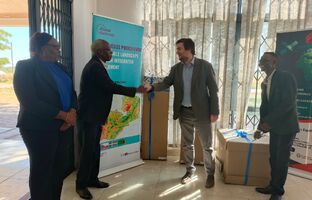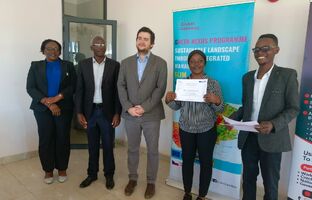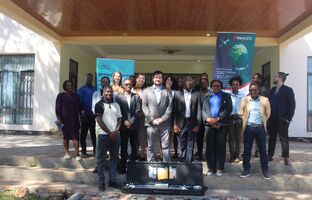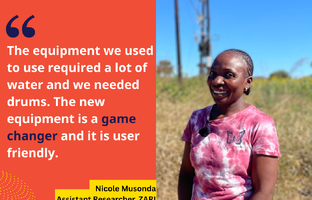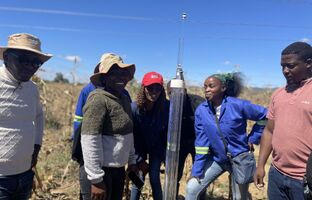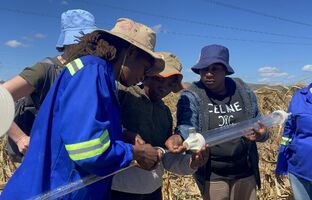Recently, the threat of land degradation has emerged as a critical environmental issue in Zambia. The project Sustainable Landscapes through Integrated Management (SLIM), co-funded by the European Union, Sweden, and the Czech Republic, is transforming how Zambia monitors, maps, and manages its land. This delegated cooperation project is being implemented by the Czech Development Agency (CzDA) in collaboration with a consortium of partners.
Land degradation caused by erosion, deforestation, unsustainable agricultural practices, and climate change poses serious challenges to food security and environmental stability in Zambia, including declining soil fertility and reduced yields. Understanding these impacts is crucial to finding solutions and mitigating future risks. With the right tools and skilled professionals, there is hope that these problems can be addressed effectively.
“Water, soil, and food security are closely interconnected. Food is produced in the soil – and the greater the production, the better the food security,” says Mumba Mwape as she adjusts instruments on a newly acquired Guelph permeameter. Around her, a team of soil scientists prepares to take key measurements that will inform the next generation of sustainable land management strategies in Zambia.
The SLIM project is being implemented by the Czech Development Agency in collaboration with People in Need (PIN), GISAT, All for Soil (AFS), and Rinato Space, which works closely with government institutions such as the Zambian Agricultural Research Institute (ZARI) and the National Remote Sensing Centre (NRSC). One of the project’s main pillars is to improve the accuracy of land degradation maps using remote sensing and direct field measurements. This requires advanced tools and trained experts.
In May 2025, the SLIM project organized a week-long training and field mission in cooperation with ZARI and AFS, focusing on the use of two newly acquired devices: the Guelph permeameter, used to measure water infiltration into the soil, and a digital soil furnace, which helps analyze soil carbon content. This activity stood out in particular for the active participation of female soil technicians, deliberately promoting the recognition and empowerment of women in science and environmental protection.
“As a woman working in agriculture, I feel proud and empowered. The training and equipment will help us improve irrigation management – especially in light of the climate changes Zambia is experiencing – and also enable us to better advise farmers on which crops to grow and which sustainable practices to use,” says Mwayi Chimsitu, a technician from ZARI specializing in soil physics and one of the training participants. These women not only use state-of-the-art instruments for soil analysis but also pioneer Zambia’s climate-smart agriculture and data-driven interventions.
During the training held at ZARI headquarters and the fieldwork in Chikankata District, participants practiced collecting and analyzing data needed for calculating soil erodibility. This data directly feeds into Zambia’s land degradation monitoring system, allowing planners and policymakers to identify the most at-risk areas and prepare targeted interventions. “This equipment allows us to work more precisely, understand soil types, and determine whether the soil is still healthy and what crops can be grown,” adds another technician, Nicole Musonda.
By equipping local experts with tools and knowledge, the SLIM project reduces Zambia’s reliance on external technical assistance and strengthens the resilience of national institutions such as ZARI. The training and equipment handover are part of SLIM’s broader commitment to the Green Nexus programme, which links the themes of water, energy, and food security. Healthy soil is a cornerstone of this approach—it affects everything from crop yields to water retention and carbon sequestration.
In addition, the SLIM project’s field data collection contributes to Zambia’s land degradation model based on the USLE/RUSLE methodology, which combines remote sensing, soil research, and local community knowledge. With further soil data collection planned in the coming months and ongoing collaboration between ZARI, CzDA, PIN, and other SLIM partners, the work is far from over. But the foundations for achieving environmental sustainability have already been laid.
“This work is fun—science is fun and very important for agricultural production,” concludes Mumba, reflecting on the training. As Zambia strives for a more sustainable agricultural future, the scientific leadership of women and the tools in their hands have the potential to transform the entire landscape.
The delegated cooperation project Sustainable Landscapes through Integrated Management (SLIM) is one of the most significant initiatives of Czech Development Cooperation in Zambia, and the first project where the Czech Development Agency acts as the sole implementing partner.



